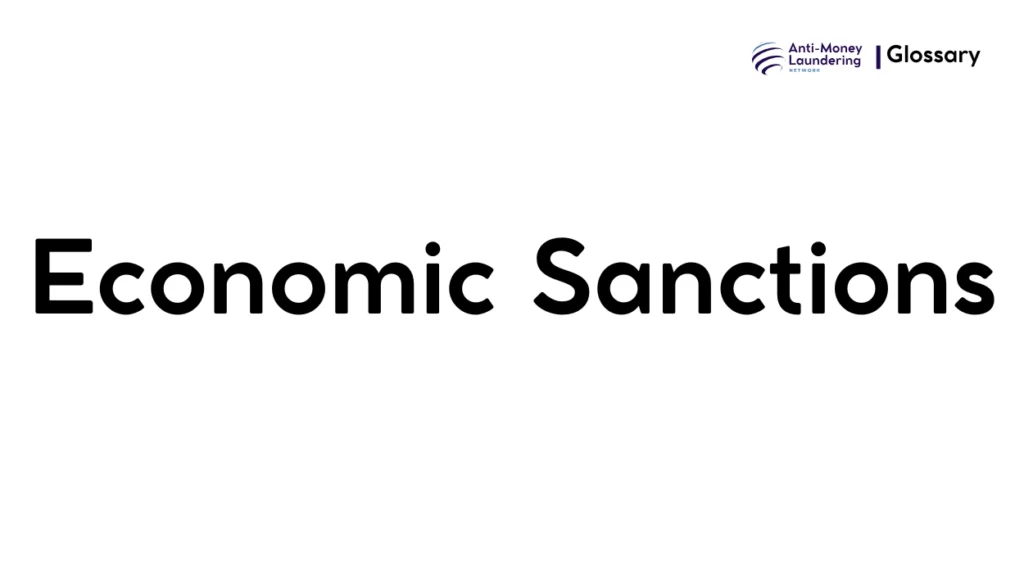Definition
Economic sanctions in Anti-Money Laundering (AML) refer to restrictive measures imposed by governments or international bodies aimed at limiting or prohibiting financial and commercial transactions with targeted individuals, entities, or countries. These sanctions are designed to prevent money laundering, terrorist financing, and other illicit activities by controlling access to financial resources.
Purpose and Regulatory Basis
Economic sanctions serve as a critical tool in AML frameworks by disrupting the financial flows that facilitate crimes such as money laundering, terrorism, and corruption. They reinforce global financial integrity and comply with international efforts to promote security and legal accountability.
Key regulatory sources include:
- Financial Action Task Force (FATF): Sets international AML and sanctions standards, encouraging member countries to implement effective measures.
- USA PATRIOT Act: Expands U.S. oversight on financial institutions to prevent terrorism and money laundering, including provisions for sanctions enforcement.
- European Union Anti-Money Laundering Directives (EU AMLD): Mandate EU countries to integrate sanctions compliance into national AML laws, requiring due diligence on sanctioned parties.
When and How it Applies
Economic sanctions apply when financial institutions or businesses conduct transactions involving sanctioned countries, entities, or individuals. Key triggers include:
- Identification of a sanctioned person or entity during customer onboarding.
- Processing or facilitating transactions that involve sanctioned jurisdictions.
- Engagement in activities restricted under sanctions such as arms trading or financing terrorism.
Examples include asset freezes on suspected terrorist financiers, prohibitions on dealing with sanctioned countries like North Korea, or restrictions on luxury goods exports to sanctioned entities.
Types or Variants of Economic Sanctions
Sanctions can take several forms, often tailored to the objectives of sanctioning bodies:
- Comprehensive Sanctions: Blanket prohibitions on all transactions with a specific country (e.g., full sanctions on Iran).
- Targeted Sanctions: Focused restrictions on specific individuals or entities, such as asset freezes or travel bans.
- Sectoral Sanctions: Limitations on particular economic sectors like energy or finance within a country.
- Trade Embargoes: Prohibitions on specific goods or services from being traded or exported.
- Arms Embargoes: Ban on the sale or transfer of weapons to certain groups or states.
Procedures and Implementation
Financial institutions implement economic sanctions controls through several steps:
- Screening: Automated tools screen customers, transactions, and counterparties against updated sanctions lists (e.g., OFAC, UN lists).
- Due Diligence: Enhanced customer due diligence (CDD) for high-risk or flagged individuals and entities.
- Transaction Monitoring: Continuous surveillance to detect potential sanctions breaches during transaction processing.
- Escalation and Reporting: Suspicious activity is flagged and reported internally, with potential external reporting to regulators.
- Training and Awareness: Ongoing staff training to recognize and manage sanctions risks.
- Record-Keeping: Maintaining documentation to prove compliance efforts during audits or investigations.
Impact on Customers/Clients
From a customer’s perspective, sanctions affect rights and interactions as follows:
- Access Restrictions: Sanctioned clients may experience asset freezes, account closures, or denial of service.
- Increased Scrutiny: Legitimate customers connected to sanctioned individuals or regions may undergo enhanced verification.
- Notification: Usually, direct notification about sanction restrictions is limited or regulated to avoid tipping off.
- Legal Consequences: Customers violating sanctions could face penalties, fines, or prosecution.
Duration, Review, and Resolution
Sanctions are imposed for variable durations depending on the geopolitical context or regulatory mandate. Institutions must:
- Regularly update sanctions lists and monitor regulatory changes.
- Conduct periodic reviews of flagged accounts and transactions.
- Lift sanctions or update restrictions as regulatory or diplomatic developments occur.
- Maintain records of reviews and resolutions for compliance audits.
Reporting and Compliance Duties
Institutions are legally obligated to:
- Report detected sanction breaches to appropriate authorities (e.g., FinCEN, OFAC).
- Maintain comprehensive logs of sanctions screening and decisions.
- Submit Suspicious Activity Reports (SARs) when applicable.
- Cooperate with regulators during inspections or investigations.
Failure to comply can result in substantial fines, reputational damage, or legal action.
Related AML Terms
Economic sanctions are closely linked to:
- Know Your Customer (KYC): Identifying and verifying sanctioned individuals early in the relationship.
- Suspicious Activity Reporting (SAR): Reporting potential sanctions violations.
- Politically Exposed Persons (PEP): High-risk individuals often subject to sanctions scrutiny.
- Terrorist Financing (TF): Sanctions help disrupt funds used for terrorism.
- Correspondent Banking: Sanctions compliance critical in cross-border transactions.
Challenges and Best Practices
Common challenges include:
- Keeping sanctions lists up to date amid frequent changes.
- Managing false positives from screening processes, which can disrupt legitimate transactions.
- Aligning sanctions compliance across multiple jurisdictions with varying regulations.
- Integrating automated technologies while maintaining human oversight.
Best practices to address these challenges:
- Implement advanced, dynamic sanctions screening technology supported by manual review.
- Conduct regular training and audits to ensure awareness and compliance.
- Establish clear internal escalation protocols for suspected violations.
- Collaborate with legal and regulatory advisers for evolving sanctions guidance.
Recent Developments
Recent trends in economic sanctions within AML include:
- Increased use of Artificial Intelligence and machine learning for better risk detection.
- Expansion of sanctions to include cyber-related offenses and technology transfers.
- Greater international cooperation for unified sanction actions against transnational crimes.
- Intensified focus on sanctions related to financial crimes linked to ransomware and illicit cryptocurrency activities.
Economic sanctions are a foundational element of AML frameworks, effectively restricting illicit financial activities by targeting designated persons, entities, and sectors. Compliance with sanctions ensures that financial institutions uphold global regulatory standards, mitigating risk and reinforcing the integrity of the financial system.

